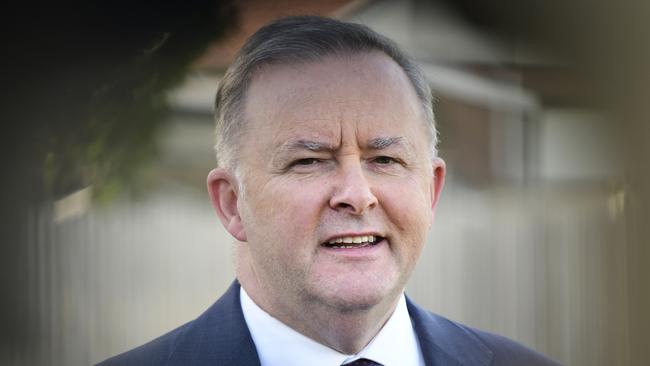Albanese targets grassroots support for ALP leadership
Anthony Albanese has ramped up his bid to become Labor’s next leader and is assembling a team of volunteers.

Anthony Albanese has ramped up his bid to become Labor’s next leader and is assembling a team of volunteers to run social media and direct-engagement campaigns aimed directly at ordinary rank-and-file members of the party.
Described yesterday by backers as a “rock star” of Labor Party branches, Mr Albanese has wasted no time in trying to cement his leadership ambitions, including the appointment of South Australian left-winger Mark Butler as his campaign manager.
Mr Albanese, a Left faction powerbroker, yesterday emerged as the clear frontrunner in the contest to replace Bill Shorten, as Chris Bowen — the architect of Labor’s rejected “retiree tax” and negative gearing assault — declared his candidacy for the leadership.
The Labor Right faction has fractured over the battle for the party’s leadership as senior figures last night implored Mr Bowen to pull out of the race against Mr Albanese in favour of Queenslander Jim Chalmers.
Mr Chalmers, 41, was last night still prepared to stand for the leadership on a platform of generational change and reconnecting with voters in his home state, where Labor’s primary vote plunged to 27.3 per cent on the weekend. But the opposition finance spokesman has told colleagues he would not stand if Mr Bowen stayed in the contest.
Senior Right faction figures were last night trying to persuade Mr Bowen to withdraw to make way for Mr Chalmers, arguing he was “not a viable candidate”.
Labor is pushing to have the leadership contest finished by the time parliament resumes, which is anticipated to be late next month, so the party can avoid the spectacle of having Mr Shorten face the victorious Scott Morrison across the House of Representatives dispatch box.
The Australian can reveal Mr Albanese is planning a major social media campaign to energise the party’s base around his bid to take the ALP’s top job, arguing he can connect with everyday Australians and beat the Prime Minister in 2022.
Mr Bowen launched his leadership campaign outside his childhood home in working-class Smithfield, in Sydney’s west, saying he was “running to win” on a platform of economic growth and opportunity for everyday Australians. “My pitch is I can connect with suburban and regional Australia. I come from the suburbs, from here,” he said.
“My wife and I are raising two wonderful kids down the road from here, in Smithfield, the same suburb I grew up in from this house. I can, I think, lead the economic debate, which we must win, as leader.”
It’s understood Mr Albanese can count on support from across the Left faction, as well as on the Right, particularly in his home state of NSW, where senior caucus colleagues and branch secretary Kaila Murnain were refusing to endorse his candidacy.
One of his backers told The Australian Mr Albanese would “wipe the floor” with Mr Bowen in the vote of branch members, and would also carry the majority of caucus members, in the two ballots weighted 50-50 to decide the next Labor leader.
A senior party strategist also questioned why Labor would back Mr Shorten’s Treasury spokesman as leader, declaring: “If they choose Chris Bowen they might as well leave Bill Shorten in place.”
Mr Albanese said Labor had to realise it had lost, and methodically work through why voters rejected it. “What we shouldn’t do is pretend we didn’t lose. We lost. We got the votes of one in three Australians on Saturday,” he said, adding that he saw jobs as being central to Labor’s agenda.




To join the conversation, please log in. Don't have an account? Register
Join the conversation, you are commenting as Logout